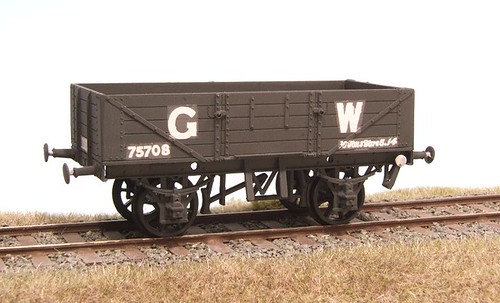I've built a few Great Western wagons over the years and the weirdo brake gear has always confused me. Normal brake gear I understand, push the lever down and the brakes come on. If there is a clever cam arrangement then the brakes come on on both sides.
Dean-Churchwood brake gear seems a lot more complicated and drawings didn't really explain it to me. My solution has been to build normal wagons with normal brakes. Even the GWR eventually saw sense after all.
Last week however, I had the chance to photograph a DC fitted wagon at the Severn Valley Railway. The vehicle is mostly missing a floor which makes the light a lot better for taking snaps. Best of all, I remembered how to use the panorama function on my compact camera to capture all the action.You might want to click on the image to see the details.
It still looks over-complicated to me. If anyone can explain the benefits, I'm all ears.


I'm so glad I don't model GWR, especially the earlier period as that looks like a complicated mess. Probably simpler than some Walshaerts valve gear, but then I haven't got to that point either yet :)
ReplyDeletePhil, There is an operational advantage to Dean-Churchward brake gear (DC), which if it had been adopted more widely would have lead to significant savings. With 'conventional' wagon brakes they are applied and then pinned in the ON position or in the case of a post DC GWR wagon held by a ratchet. To ensure that all the brakes on a train are OFF the guard or shunter has to walk round the entire train.
ReplyDeleteWith DC brakes they can be applied or taken off from either side. There are no pins to mess about with or levers to prise out of ratchets.
These might be small things on an individual wagon basis but on a 30 or 40 wagon train could amount to a saving of several minutes. That would reflect quite quickly onto a reduction in the wages budget - don't forget that there would be a driver and fireman hanging around waiting for the guard to have train ready for the 'right away'
Geoff